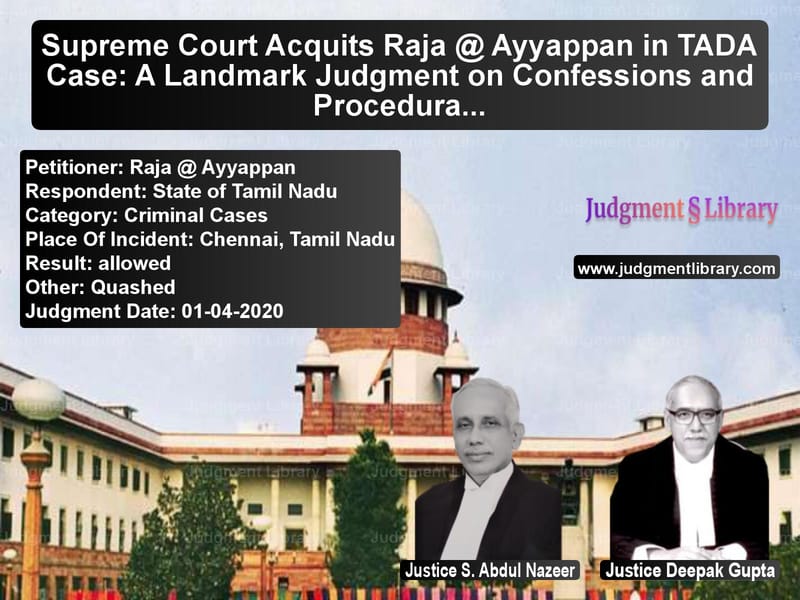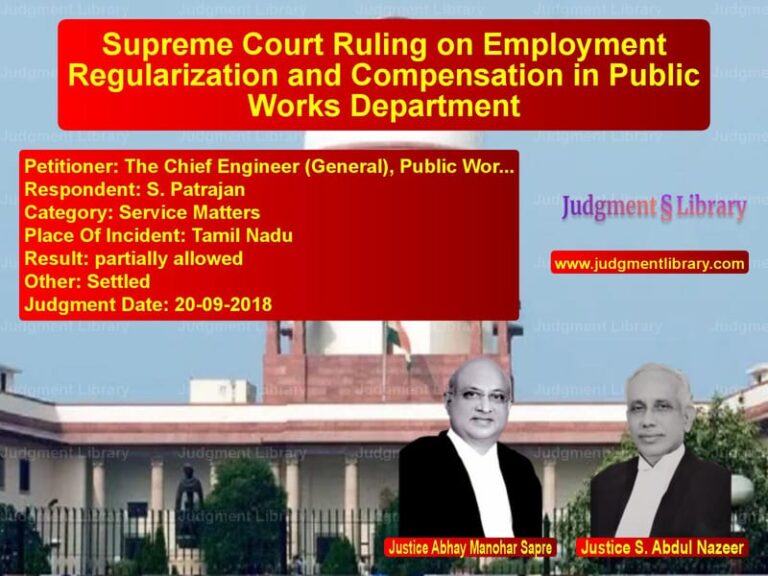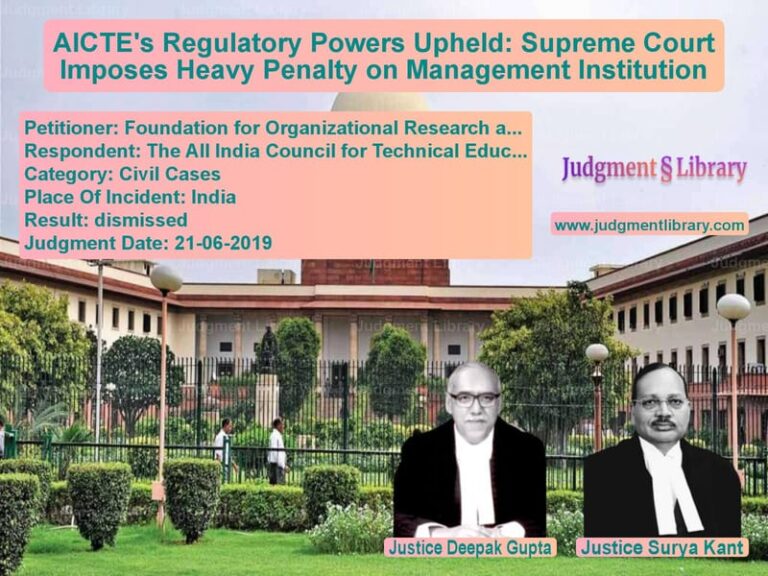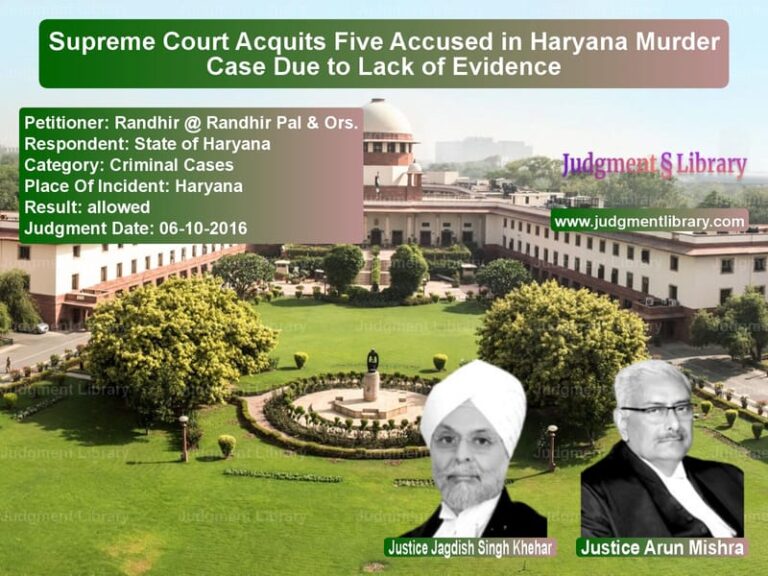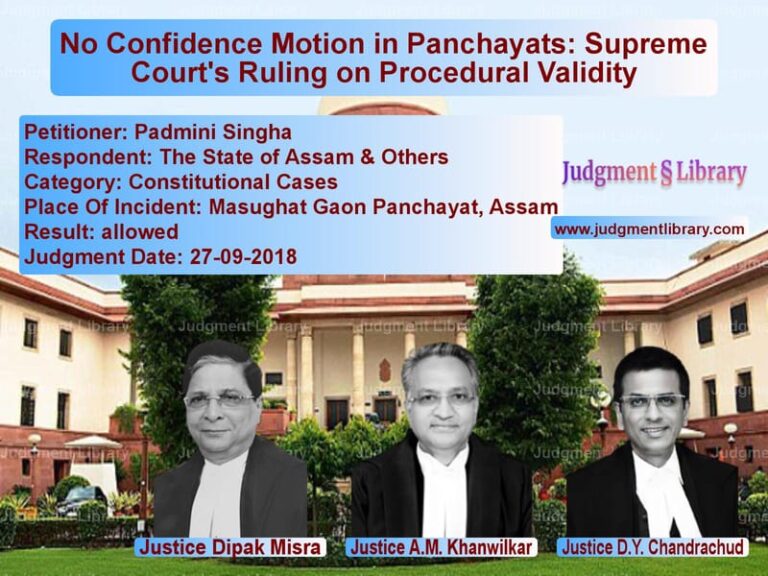Supreme Court Acquits Raja @ Ayyappan in TADA Case: A Landmark Judgment on Confessions and Procedural Safeguards
The case of Raja @ Ayyappan vs. State of Tamil Nadu has raised significant legal questions regarding the admissibility of confessions under the Terrorist and Disruptive Activities (Prevention) Act, 1987 (TADA) and the procedural safeguards required for a fair trial. The Supreme Court, in a detailed judgment, overturned the conviction of the appellant, Raja @ Ayyappan, emphasizing the need for due process and fair treatment in cases involving confessions.
Background of the Case
The appellant, Raja @ Ayyappan, was convicted by the Designated Court No.2, Chennai, under multiple provisions of the Indian Penal Code (IPC), the TADA Act, and the Explosive Substances Act, 1908. The prosecution alleged that the appellant, along with other accused persons, was involved in a conspiracy to conduct bomb blasts to achieve a separate statehood for Tamil Nadu.
According to the prosecution, a militant organization named Tamilar Pasarai was formed with the objective of targeting government buildings. As part of this conspiracy, a bomb was placed near the Secretariat building in Chennai on September 22, 1990. However, before the explosion, a police constable discovered the bomb, which was later defused.
The investigation led to the arrest of multiple individuals, and confessional statements were recorded under Section 15 of the TADA Act. The appellant was arrested much later in 2007 and was tried separately. The Designated Court convicted him primarily based on his confession and the confessions of co-accused persons.
Key Legal Issues Raised
- Was the confession of the appellant voluntary and admissible in evidence?
- Could the confessions of co-accused be used against the appellant in a separate trial?
- Were the procedural safeguards under TADA and the Indian Evidence Act followed?
Petitioner’s Arguments
The appellant, through his counsel, contended:
- His confession was obtained under duress and torture, making it inadmissible in law.
- He was subjected to custodial torture and forced to sign papers, violating his fundamental rights under Article 21 of the Constitution.
- The prosecution failed to establish his direct involvement in the crime through independent corroborative evidence.
- The confession of co-accused persons could not be used against him as there was no joint trial.
- The investigating authorities did not follow the mandatory procedural safeguards laid down in Kartar Singh v. State of Punjab (1994).
Respondent’s Arguments
The State of Tamil Nadu, defending the conviction, argued:
- The confession was recorded by a senior police officer, as mandated by Section 15 of the TADA Act, and was thus admissible.
- The accused had voluntarily confessed and had not retracted the statement immediately.
- Confessions of co-accused persons were sufficient corroborative evidence to prove his guilt.
- The Designated Court had correctly interpreted the legal provisions while convicting the appellant.
Supreme Court’s Analysis and Judgment
The Supreme Court critically examined the evidentiary value of the confessions and the procedural safeguards under the TADA Act.
- The Court reiterated that a confession must be voluntary and free from coercion to be admissible.
- “A confession that is not free from doubt about its voluntariness is inadmissible in evidence.”
- The Court noted that the confession recorded under Section 15 of TADA was the sole basis of conviction, and there was no independent corroborative evidence.
- The Supreme Court also ruled that the confessions of co-accused could not be used against the appellant in a separate trial.
- The mandatory safeguards, such as producing the accused before a magistrate after recording the confession, were not followed.
Based on these findings, the Court ruled that the conviction was not sustainable in law and set aside the judgment of the Designated Court.
Key Takeaways from the Judgment
- Strict Adherence to Procedural Safeguards: The judgment underscores the importance of following procedural safeguards under the TADA Act.
- Inadmissibility of Co-accused Confessions in Separate Trials: A confession made by a co-accused is not admissible unless the accused are tried jointly.
- Voluntariness of Confessions: The Court reiterated that any confession obtained under coercion or torture cannot be relied upon for conviction.
- Burden of Proof on Prosecution: The prosecution must prove the accused’s guilt beyond a reasonable doubt and cannot solely rely on confessions.
Conclusion
The Supreme Court’s decision in Raja @ Ayyappan vs. State of Tamil Nadu is a landmark ruling reaffirming the principles of natural justice and due process. It ensures that confessions obtained under coercion are not used as a shortcut to convictions. The ruling serves as a significant precedent in criminal jurisprudence, particularly in cases involving stringent anti-terror laws.
By overturning the conviction, the Court has sent a clear message that the rule of law must prevail, even in cases concerning national security. This judgment will likely influence future cases where procedural lapses and wrongful convictions based on confessions come under scrutiny.
Petitioner Name: Raja @ Ayyappan.Respondent Name: State of Tamil Nadu.Judgment By: Justice S. Abdul Nazeer, Justice Deepak Gupta.Place Of Incident: Chennai, Tamil Nadu.Judgment Date: 01-04-2020.
Don’t miss out on the full details! Download the complete judgment in PDF format below and gain valuable insights instantly!
Download Judgment: Raja @ Ayyappan vs State of Tamil Nadu Supreme Court of India Judgment Dated 01-04-2020.pdf
Direct Downlaod Judgment: Direct downlaod this Judgment
See all petitions in Terrorist Activities
See all petitions in Custodial Deaths and Police Misconduct
See all petitions in Attempt to Murder Cases
See all petitions in Judgment by S. Abdul Nazeer
See all petitions in Judgment by Deepak Gupta
See all petitions in allowed
See all petitions in Quashed
See all petitions in supreme court of India judgments April 2020
See all petitions in 2020 judgments
See all posts in Criminal Cases Category
See all allowed petitions in Criminal Cases Category
See all Dismissed petitions in Criminal Cases Category
See all partially allowed petitions in Criminal Cases Category

